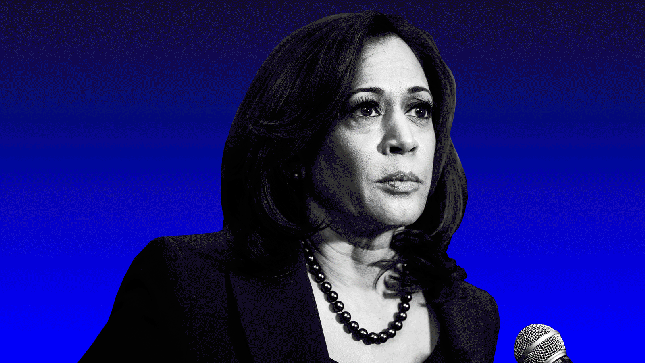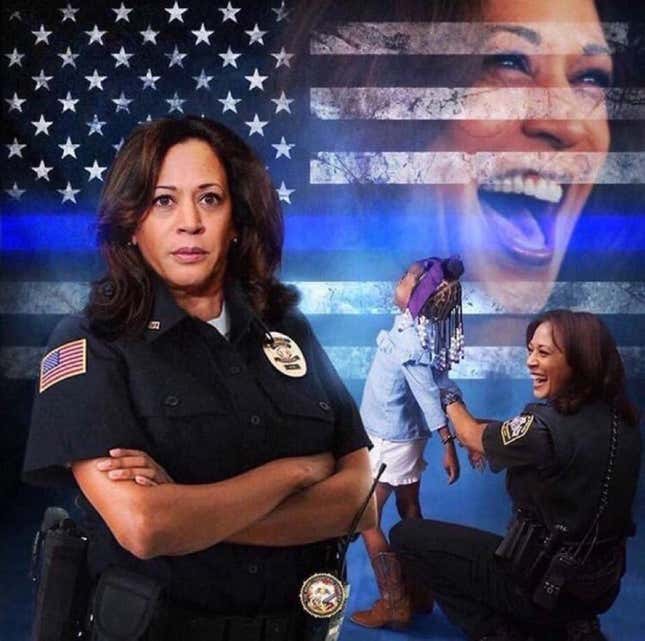
Graphic: Jezebel. Photo: Getty
It’s only appropriate for a decade defined by the steady mainstreaming of internet memes to end with one so powerful it may have changed a presidential campaign. In the last couple of years, the political rise of Kamala Harris, from California Senator to presidential hopeful, has been met with a terse but effective meme: “Kamala Is a Cop.” Rooted in Kamala Harris’s tenure as San Francisco District Attorney and California Attorney General, the refrain started as a disdainful sneer from those disillusioned with her one-time “tough on crime” stance, blossoming into a full-blown meme that leftists, opportunistic right-wingers, Black Twitter, and bots wielded with gusto to represent everything and anything that was wrong with Harris’s desire for more political power. Now that Harris has announced that she’s ending her presidential campaign, the meme’s impact is worth a deeper examination.
“Kamala Is a Cop” has no set format or singular image: It’s a philosophy translated into meme form. There are photoshopped images of Harris wearing police gear and arresting black children. People manifested the meme in joking tweets about Harris arresting them for minor infractions, like wearing white after Labor Day. A brief clip of Harris waving at undocumented children in a detention center was stripped of context and turned into miscellaneous meme fodder, spurring another opportunity to play at her carceral wrath.

The refrain was particularly evocative as Harris struggled to lure black voters away from Joe Biden, Elizabeth Warren, and Bernie Sanders, despite being one of the few black candidates running in the primary. Last week, the New York Times spoke with a number of the black voters who weren’t backing black candidates Harris or Cory Booker for president—including a 20-year-old black woman, who had just attended a “Black Woman’s Breakfast” featuring Senator Harris. The woman expressed skepticism toward Harris’s campaign, citing a mortification that grew, in part, from memes (emphasis ours):
Ms. Hester made a sheepish admission: Ms. Harris was not her preferred choice. There were policy reasons — Ms. Harris has not rolled out a proposal on student debt cancellation, which is Ms. Hester’s top issue. But there was also something else. Even at the historically black all-women’s college that Ms. Hester attends, supporting Ms. Harris was a particularly uncool thing to do.
“It’s hard, you know. On social media, there’s a different meme about her every day,” Ms. Hester said. “A lot of young people don’t support her.”
Shockingly, it’s a faux pas to support the candidate your classmates sneeringly refer to as a cop! How, I wondered, how does Harris feel about reaching pariah status within online circles of young, politically astute black women?
There are photoshopped images of Harris wearing police gear and arresting black children.
I contacted the Harris campaign last week to find out: What does Harris think of the “Kamala Is a Cop” meme, and is she worried that it has stifled youth support? The response I received was somewhat brusque: A link to a Blavity round table with Harris, in which she briefly acknowledged the memes after a long defense of her record, and a quote from the aforementioned Black Women’s Breakfast, in which Harris said that she’s “fully aware” of the cop memes and that they break her heart. “Are we saying that we don’t want the people making these decisions to be someone who goes to the same church, has children in the same community?” she added. “No. We need to be everywhere.”
The next day, I received another email from the Harris camp suggesting my article about the “Kamala Is a Cop” memes “include evidence of disinformation online.” This was accompanied by a list of six articles that the Harris camp believed I would find helpful.
-

-

-

-

-

-

-

-

-

-

-

-

-

-

-

-

-

-

-

-

-

-

-

-

-

-

-

-

-

-

-

-

-

-

-

-

-

-

-

-








































